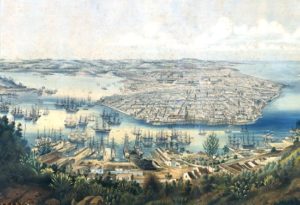Cuba
During the American Revolutionary War, trade with Cuba was valued by citizens of the United States of America as an opportunity to earn scarce hard currency in the wake of a hyper-inflated dollar. The colonists needed to import manufactured goods for the war. Cuban cigars were a welcome luxury import, enjoyed by General George Washington and other notables. This trade was actively encouraged by the Cubans and the Spanish to assist the struggling United States of America during a time of crisis.
 By the mid-18th century, Havana had been established for almost 250 years and was home to more than 80,000 people. The walled city was built to specific architectural rules as were all of the early cities of Spanish America, with carved gates that enclosed whitewashed houses with red tiled roofs, stately homes with heavy wooden doors and large courtyards, the central Plaza de Armas, and a Franciscan monastery, Dominican university and Jesuit college. With its protected port, the city was a critical shipping hub for the wealth of the Spanish empire, and the departure point for the massive fleet of treasure ships that still sailed annually to Spain.
By the mid-18th century, Havana had been established for almost 250 years and was home to more than 80,000 people. The walled city was built to specific architectural rules as were all of the early cities of Spanish America, with carved gates that enclosed whitewashed houses with red tiled roofs, stately homes with heavy wooden doors and large courtyards, the central Plaza de Armas, and a Franciscan monastery, Dominican university and Jesuit college. With its protected port, the city was a critical shipping hub for the wealth of the Spanish empire, and the departure point for the massive fleet of treasure ships that still sailed annually to Spain.
Havana was known as the ‘Key to the New World’, and during the American Revolutionary War, it was the center of operations to aid the North Americans, either directly through providing gunpowder and other military supplies, or indirectly by providing a trading port in which the colonists could sell commodities such as flour to earn desperately needed hard currency.
Early in 1776, the Spanish in Havana began to send observers to the colonies, to meet with General George Washington and members of Congress. One agent succeeded in getting through the British blockade, Juan De Miralles. Miralles was from an established, wealthy merchant family in Havana, fluent in English, and had extensive business dealings with Robert Morris, the chief financier of the American Revolution. He remained in the colonies as an informal diplomat and orchestrated the import and export trade between the colonies and Cuba. De Miralles spent much of his time during those years in North America, often at Washington’s headquarters.
In 1779, after the Spanish declaration of war against the British, Havana became the staging point for the fierce fighting against the British in North America. Bernardo de Gálvez led two fleets against the British to capture Pensacola, Florida, finally succeeding in May 1781. In addition to providing port facilities, supplies, and financing, the Cuban militia, including free Afro-Cuban soldiers, fought in the battle.
Havana and its citizens played a dramatic role in the 1781 Battle of Yorktown. In August 1781, the French Navy was sailing from the Caribbean to Virginia to join the French Army and the colonists against the British. The French needed hard currency for supplies to sail, and the struggling United States Continental Army needed money for payroll and supplies. The Spanish authorities in Havana had prepared to aid the French and North Americans, planning to finance the fleet with silver pesos from the fabulously rich Mexican mines shipped through the port of Veracruz. These wooden sailing ships, full of barrels of coins and dependent on Caribbean sea winds to drive their canvas sails, had not yet arrived. The official Spanish Treasury in Havana was empty.
Notices were hastily posted throughout the walled city that citizens of Havana who wished to loan money to the Spanish government for the war effort should bring their currency immediately to the city Treasury. Within six hours, the huge sum of 500,000 Spanish pesos was sent by twenty-seven men and one woman. The coins were loaded on a ship of the French fleet anchored near the Cuban coast.
Guided by Cuban pilots for the early part of their journey, the fleet continued north through the dangerous Bahamian Channel to reach the Chesapeake Bay on August 30 1781 in timing that was perilously close for the lengthy chains of 18th century war maneuvers. These funds were used to purchase the supplies and payroll for the troops in the Battle of Yorktown, in which the British were defeated. Yorktown was one of the few battles that the North Americans won, and was the last major battle of the American Revolutionary War.
